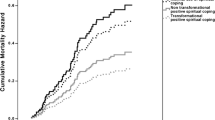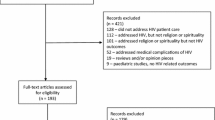Abstract
The present study investigated the relationships between positive religious coping (e.g., seeking spiritual support) and spiritual struggle (e.g., anger at God) versus viral load, CD4 count, quality of life, HIV symptoms, depression, self-esteem, social support, and spiritual well-being in 429 patients with HIV/AIDS. Data were collected through patient interview and chart review at baseline and 12–18 months later from four clinical sites. At baseline, positive religious coping was associated with positive outcomes while spiritual struggle was associated with negative outcomes. In addition, high levels of positive religious coping and low levels of spiritual struggle were associated with small but significant improvements over time. These results have implications for assessing religious coping and designing interventions targeting spiritual struggle in patients with HIV/AIDS.
Similar content being viewed by others
References
Andresen, E. M., Malmgren, J. A., Carter, W. B., & Patrick, D. L. (1994). Screening for depression in well older adults: Evaluation of a short form of the CES-D (Center for Epidemiologic Studies Depression Scale). American Journal of Preventative Medicine, 10, 77–84.
Avants, S. K., Beitel, M., & Margolin, A. (2005). Making the shift from ‘addict self’ to ‘spiritual self’: Results from a stage I study of Spiritual Self-Schema (3-S) therapy for the treatment of addiction and HIV risk behavior. Mental Health, Religion and Culture, 8, 167–177.
Bormann, J. E., Gifford, A. L., Shively, M., Smith, T. L., Redwine, L., Kelly, A., et al. (2006). Effects of spiritual mantram repetition on HIV outcomes: A randomized controlled trial. Journal of Behavioral Medicine, 29, 359–376.
Brady, M. J., Peterman, A. H., Fitchett, G., & Cella, D. (1999). The expanded version of the functional assessment of chronic illness therapy – spiritual well-being scale (FACIT-SP-Ex): Initial report of psychometric properties. Annals of Behavioral Medicine, 21, 129.
Cohen, S., Mermelstein, R., Kamarck, T., & Hoberman, S. (1985). Measuring the functional components of social support. In I. Sarason & B. Sarason (Eds.), Social support: Theory, research, and applications (pp. 73–94). The Hague, Netherlands: Martinus Nijhoff.
Coleman, C. L. (2004). The contribution of religious and existential well-being to depression among African American heterosexuals with HIV infection. Issues in Mental Health Nursing, 25, 103–110.
Corless, I. B. (2002). The HIV-AIDS patient: Holier than thou. In R. B. Gilbert (Ed.), Health care and spirituality: Listening, assessing, caring (pp. 189–200). Amityville: Baywood Publishing Company, Inc.
Cotton, S., Puchalski, C. M., Sherman, S. N., Mrus, J. M., Peterman, A. H., Feinberg, J., et al. (2006). Spirituality and religion in patients with HIV/AIDS. Journal of General Internal Medicine, 21, S5–S13.
Cotton, S., Tsevat, J., Szaflarski, M., Kudel, I., Sherman, S. N., Feinberg, J., et al. (2006). Changes in religiousness and spirituality attributed to HIV/AIDS: Are there sex and race differences? Journal of General Internal Medicine, 21(Supplement 5), S14–S20.
Fitchett, G., Murphy, P. E., Kim, J., Gibbons, J. L., Cameron, J. R., & Davis, J. A. (2004). Religious struggle: Prevalence, correlates, and mental health risks in diabetic, congestive heart failure, and oncology patients. International Journal of Psychiatry in Medicine, 34, 179–196.
Fitchett, G., Rybarczyk, B. D., DeMarco, G. A., & Nicholas, J. J. (1999). The role of religion in medical rehabilitation outcomes: A longitudinal study. Rehabilitation Psychology, 44, 333–353.
Flannelly, L. T., & Inouye, J. (2001). Relationships of religion, health status, and socioeconomic status to the quality of life of individuals who are HIV positive. Issues in Mental Health Nursing, 22, 253–272.
Frame, M. W., Uphold, C. R., Shehan, C. L., & Reid, K. J. (2005). Effects of spirituality on health-related quality of life in men with HIV/AIDS: Implications for counseling. Counseling and Values, 50, 5–19.
Guillory, J. A., Sowell, R., Moneyham, L., & Seals, B. (1997). An exploration of the meaning and use of spirituality among women with HIV/AIDS. Alternative Therapies in Health and Medicine, 3, 55–60.
Hall, B. A. (1998). Patterns of spirituality in persons with advanced HIV disease. Research in Nursing and Health, 21, 143–153.
Harrison, M. O., Koenig, H. G., Hays, J. C., Eme-Akwari, A. G., & Pargament, K. I. (2001). The epidemiology of religious coping: A review of recent literature. International Review of Psychiatry, 13, 86–93.
Holmes, W. C., & Shea, J. A. (1998). A new HIV/AIDS-targeted quality of life (HAT-QoL) instrument: Development, reliability, and validity. Medical Care, 36, 138–154.
Holt, J. L., Houg, B. L., & Romano, J. L. (1999). Spiritual wellness for clients HIV/AIDS: Review of counseling issues. Journal of Counseling and Development, 77, 160–170.
Ironson, G., Stuezle, R., & Fletcher, M. A. (2006). An increase in religiousness/spirituality occurs after HIV diagnosis and predicts slower disease progression over 4 years in people with HIV. Journal of General Internal Medicine, 21, S62–S68.
Ironson, G., Stuezle, R., Fletcher, M. A., & Ironson, D. (2006). View of god is associated with disease progression in HIV [abstract]. Annuls of Behavioral Medicine, 31(Suppl), S074.
Jacobson, C. J. Jr., Luckhaupt, S. E., Delaney, S., & Tsevat, J. (2006). Religio-biography, coping, and meaning-making among persons with HIV/AIDS. Journal for the Scientific Study of Religion, 45, 39–56.
Jenkins, R. A. (1995). Religion and HIV: Implications for research and intervention. Journal of Social Issues, 51, 131–144.
Jones, J. W. (1991). Contemporary psychoanalysis and religion: Transference and transcendence. New Haven: Yale University Press.
Justice, A. C., Holmes, W., Gifford, A. L., Rabeneck, L., Zackin, R., Sinclair, G., et al. (2001). Development and validation of a self-completed HIV symptom index. Journal of Clinical Epidemiology, 54(supplement), S77–S90.
Koenig, H., Parkerson, G. R., & Meador, K. G. (1997). Religion index for psychiatric research. American Journal of Psychiatry, 154, 885–886.
Margolin, A., Beitel, M., Schuman-Olivier, Z., & Avants, S. K. (2006). A controlled study of a spiritually-focused intervention for increasing motivation for HIV prevention among drug users. AIDS Education and Prevention, 18, 311–322.
Meisenhelder, J. B., & Marcum, J. P. (2004). Responses of clergy to 9/11: Posttraumatic stress, coping, and religious outcomes. Journal for the Scientific Study of Religion, 43, 547–554.
Menz, R. L. (1987). Aiding those with AIDS: A mission for the church. Journal of Psychology and Christianity, 6, 5–18.
Pargament, K. I. (1997). The psychology of religion and coping: Theory, research, practice. New York: The Guilford Press.
Pargament, K. I., Koenig, H. G., & Perez, L. M. (2000). The many methods of religious coping: Development and initial validation of the RCOPE. Journal of Clinical Psychology, 56, 519–543.
Pargament, K. I., Koenig, H. G., Tarakeshwar, N., & Hahn, J. (2004). Religious coping methods as predictors of psychological, physical and spiritual outcomes among medically ill elderly patients: A longitudinal study. Journal of Health Psychology, 9, 713–730.
Pargament, K. I., McCarthy, S., Shah, P., Ano, G., Tarakeshwar, N., Wachholtz, A., et al. (2004). Religion and HIV: A review of the literature and clinical implications. Southern Medical Journal, 97, 1201–1209.
Pargament, K. I., Murray-Swank, N., Magyar, G. M., & Ano, G. (2005). Spiritual struggle: A phenomenon of interest to psychology and religion. In W. R. Miller & H. D. Delaney (Eds.), Judeo-Christian perspectives on psychology: Human nature, motivation, and change (pp. 245–268). Washington: American Psychological Association.
Pargament, K. I., Smith, B. W., Koenig, H. G., & Perez, L. (1998). Patterns of positive and negative religious coping with major life stressors. Journal for the Scientific Study of Religion, 37, 710–724.
Parsons, S. K., Cruise, P. L., Davenport, W. M., & Jones, V. (2006). Religious beliefs, practices and treatment adherence among individuals with HIV in the sourthern United States. AIDS Patient Care and STDs, 20, 97–111.
Prest, L. A., & Robinson, W. D. (2006). Systemic assessment and treatment of depression and anxiety in families. Journal of Systemic Therapies, 25, 4–24.
Radloff, L. S. (1977). The CES-D scale: A self-report depression scale for research in the general population. Applied Psychological Measurement, 1, 385–401.
Ramer, L., Johnson, D., Chan, L., & Barrett, M. T. (2006). The effect of HIV/AIDS disease progression on spirituality and self-transcendence in a multicultural population. Journal of Transcultural Nursing, 17, 280–289.
Rizzuto, A. M. (1979). The birth of the living God: A psychoanalytic study. Chicago: University of Chicago Press.
Robinson, J., & Shaver, P. R. (1969). Measuring Social Psychological Attitudes. Ann Arbor: Institute for Social Research.
Simoni, J. M., Martone, M. G., & Kerwin, J. F. (2002). Spirituality and psychological adaptation among women with HIV/AIDS: Implications for counseling. Journal of Counseling Psychology, 49, 139–147.
Simoni, J. M., & Ortiz, M. Z. (2003). Mediational models of spirituality and depressive symptomatology among HIV-positive Puerto Rican women. Cultural Diversity and Ethnic Minority Psychology, 9, 3–15.
Somlai, A. M., Heckman, T. G. (2000). Correlates of spirituality and well-being in a community sample of people living with HIV disease. Mental Health, Religion, and Culture, 3, 57–70.
Sowell, R., Moneyham, L., Hennessy, M., Guillory, J., Demi, A., & Seals, B. (2000). Spiritual activities as a resistance resource for women with human immunodeficiency virus. Nursing Research, 49, 73–82.
Szaflarski, M., Ritchey, P. N., Leonard, A. C., Mrus, J. M., Peterman, A. H., Ellison, C. G., et al. (2006). Modeling the effects of spirituality/religion on patients’ perceptions of living with HIV/AIDS. Journal of General Internal Medicine, 21, S28–S38.
Tarakeshwar, N., Khan, N., & Sikkema, K. J. (2006). A relationship-based framework of spirituality for individuals with HIV. AIDS and Behavior, 10, 59–70.
Tarakeshwar, N., & Pargament, K. I. (2001). Religious coping in families of children with autism. Focus on Autism and Other Developmental Disabilities, 16, 247–260.
Tarakeshwar, N., Pearce, M. J., & Sikkema, K. J. (2005). Development and implementation of a spiritual coping group intervention for adults living with HIV/AIDS: A pilot study. Mental Health, Religion, and Culture, 8, 179–190.
Woods, T. E., Antoni, M. H., Ironson, G. H., & Kling, D. W. (1999). Religiosity is associated with affective and immune status in symptomatic HIV-infected gay men. Journal of Psychosomatic Research, 46, 165–176.
Woodward, E. K., & Sowell, R. (2001). God in control: Women's perspectives on managing HIV infection. Clinical Nursing Research, 10, 233–250.
Wright, L. M., Watson, W. L., & Bell, J. M. (1996). Breaking the patterns of depression. New York: Doubleday.
Yarhouse, M. A., & Anderson, G. (2002). Persons with HIV/AIDS. Journal of Psychology and Christianity, 21, 333-340.
Yi, M. S., Mrus, J. M., Wade, T. J., Ho, M. L., Hornung, R. W., Cotton, S., et al. (2006). Religion, spirituality, and depressive symptoms in patients with HIV/AIDS. Journal of General Internal Medicine, 21, S21–S27.
Author information
Authors and Affiliations
Corresponding author
Additional information
The first author was previously published as Kelly M. McConnell.
Rights and permissions
About this article
Cite this article
Trevino, K.M., Pargament, K.I., Cotton, S. et al. Religious Coping and Physiological, Psychological, Social, and Spiritual Outcomes in Patients with HIV/AIDS: Cross-sectional and Longitudinal Findings. AIDS Behav 14, 379–389 (2010). https://doi.org/10.1007/s10461-007-9332-6
Received:
Accepted:
Published:
Issue Date:
DOI: https://doi.org/10.1007/s10461-007-9332-6




